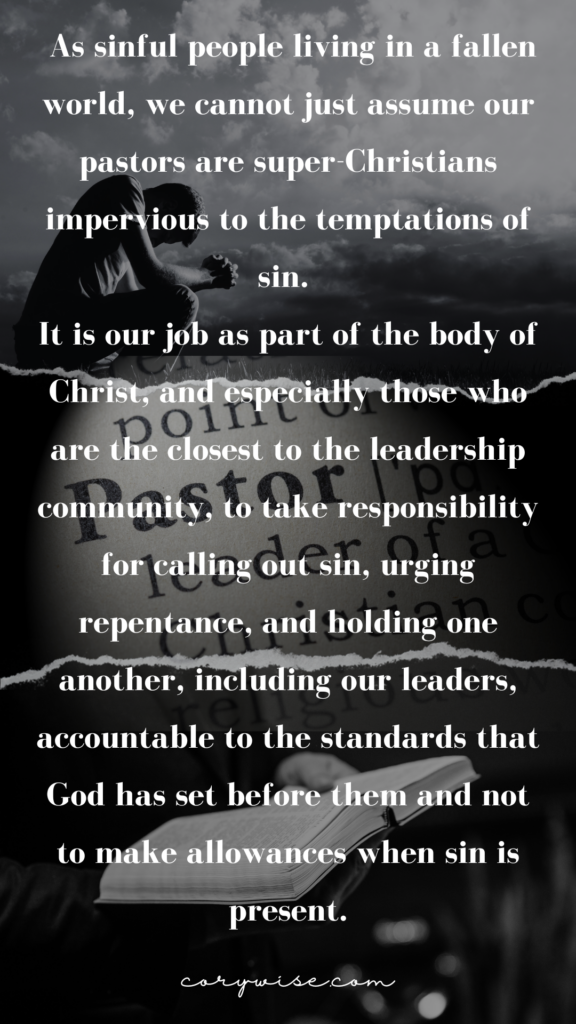Since my previous post on Spiritual Abuse went live a few weeks ago, questions have been raised about the who, the what, the where; the answers to most of which I am still keeping to myself. But the one question that continues to fester in the back of my mind, as well as the minds of others who have experienced this same spiritual abuse, is how. How does a church become spiritually abusive? How do pastors we know and love become prideful authoritarians? How did no one notice what was happening to us and stop it? How did we ourselves not notice, at least not at first. To be quite honest, I haven’t really had a good answer. I have some observations about what might have led to the destruction in my particular situation, including a culture that both encouraged and accepted gossip and cliqueiness as acceptable practices amongst the leadership, and some base-level assumptions that really all people make when they are new to a church community, affording their leadership the benefit of the doubt, but at the end of the day I really just didn’t know how to answer that question. Until now that is.
Recently, I read a book called LEAD: 12 Gospel Principles for Leadership in the Church by Paul David Tripp, in which he addresses many of the dangers that church leadership communities can face when they stray from the Biblical standards of character and lifestyle for those who are called to lead within the church community. In the introduction, Tripp says the purpose for writing this book was that he knew in the wake of so many publicly fallen pastors, there needed to be real introspection into the leadership communities that surrounded them. They didn’t rise, or fall, alone.
Once again, in the same way the authors who wrote on spiritual abuse that I mentioned in my earlier post seemed like they were right inside my head, Tripp seems to capture and confirm exactly the experience that I and others had gone through as our eyes were opened to the serious nature of what was happening around us.
Tripp begins with an anecdote about a real encounter he had with a leadership community after their pastor’s sordid secret-life was no longer secret. He recounts how the first response of the leaders, when the scandal was initially brewing, was denial. They simply could not believe horrible things about the man they had served alongside and trusted for years. Once hard evidence began to provide some weight to the accusations, the church’s leaders began to make excuses and try to come up with alternate plausible theories, because they wanted to believe the “denier’s answers” their pastor provided for every charge. But the more they dug in, it became clear they could no longer deny the truth of what was uncovered, and the more they uncovered the more they had to confess there was a lot they really didn’t know about their pastor.
Tripp further says,
“To add to their out of control feeling, the crisis had shattered their unity…the men who were most loyal to the pastor argued and debated with the men they thought were rushing to judgment; the organization guys argued with the men who tended to be more pastoral; and in all of these debates there was way too much judgment of the others’ interests and motives. Meanwhile, a shocked and hurting congregation was not getting from their leaders what they needed…As I walked with these leaders through their distress and confusion, engaging them in conversation after conversation, it was clear that they were foundationally unprepared for what they were dealing with. It wasn’t just that they were structurally unprepared; they were, more importantly, unprepared in terms of character and relationship. The fact that such basic things were missing complicated and obstructed their calling to lead their church through a very difficult moment…It has saddened me how many times I have been contacted to help a leadership community deal with a fallen leader, only to discover there were indicators all along of particular weaknesses and susceptibilities that no one in his leadership community seemed to see. Because we as leaders don’t always see ourselves with accuracy, and because we don’t always see the areas in which we are weak, we all need a protective community that is watching for us even when we aren’t as watchful as we should be. If we are to be protected, we need to be known at the level where temptation is its most powerful, the heart” [Tripp, 19; 28]
Tripp outlines 12 leadership-community gospel principles that, if followed, he hopes would protect leadership communities and bless them with long and healthy ministry life. Conversely one can then assume, not following these principles could be where churches begin to go astray, and find themselves asking the question, “how did we get here…?”
A sobering statement from his chapter on The Gospel highlights the ultimate source for many spiritual abuses.
“Here is the reality that should sober every one of us: there is sin in every church and ministry leadership community, because sin still resides in the heart of every leader. So either we are denying our sin to ourselves and hiding it from others, or we are admitting its presence to ourselves and confessing it to others. But if the acceptance and respect of fellow leaders or of the most powerful leader in the room becomes more important to us than honesty within ourselves, before God, and in relation to one another, we give room for sin to germinate, grow, and take control. Communities where leaders fall are often communities in which humble confession is not only not encouraged; it is silenced by a whole range of unspoken fears…If we are afraid to confess sin before what should be the most spiritually mature community in the church, we are sadly living in a state of functional gospel amnesia, no matter how robust our theological grasp of the gospel is” [Tripp, 58-59]
In his chapter on Limits Tripp reminds us that spiritual immaturity needs to be the base-level assumption of everyone within a leadership community, not the converse.
“No matter how long we’ve been in ministry leadership, no matter how well trained, no matter how theologically mature, we are all still in need of future spiritual developments. We all have blind spots. We all have areas of susceptibility to temptation. Each of us has character weaknesses. We are still in need of the rescuing, convicting, transforming power of the gospel…it is my experience, as I have dealt with fallen or lapsed pastors, that around them was a weak or dysfunctional leadership community that failed, in pastoral love and care, to protect that leader from himself.” [Tripp, 83-84]
Tripp continues in his chapter on Character to explain in great detail the impurity of the heart motives and sinful tendency toward idolatry that lives in each of us as a result of our sin nature, and the temptation to put our worldly ambitions and agendas above our heavenly calling and ambassadorship, especially in positions of leadership. And then right in the middle of the chapter, which has been building on this foundation of temptation to idolatry, he asks the same question, in essence, that I have wrestled with: , “How does a biblically based, gospel-committed, Christ-serving leadership community not move to lovingly confront a leader who has changed, seeking to rescue him from himself and to protect him from false ministry gods?” [Tripp, pg.110]
“How does a biblically based, gospel-committed, Christ-serving leadership community not move to lovingly confront a leader who has changed, seeking to rescue him from himself and to protect him from false ministry gods?”
Paul David Tripp, Lead: 12 Gospel Principles for Leadership in the Church
Tripp then expressed that his answer might anger some, but in truth it brought so much clarity for me.
He says,
“The reason we are often way too passive in the face of troubling evidence in the attitudes and actions of a leader is that way too often, performance trumps character…Few leadership communities say that they have come to value performance over character, but performance becomes the logic behind not dealing with issues of character. Here is the inadequate logic: “Look what this great man has done for God; should we really tarnish his ministry?” So a leadership community accepts what it should not accept, is silent when it should speak, and is passive when it should act…at the functional level the leadership community comes to value ministry success more than godly character…It’s not just that one of their leaders has changed; the entire leadership community has changed, and in many cases, they don’t seem to know it.” [Tripp, pg 111]
In my case, the church didn’t have just one abusive leader that could be singled out. There was no “head pastor” who you could point the finger at and blame for directing all the bad traffic. At the end of the day there was an entire board of men in leadership who were unwilling to acknowledge what was happening right in front of them. And while I assume they each had their own motives for turning a blind eye, they certainly united against exposure to the truth, as a community of leaders whose values had most certainly shifted in focus.
At first my husband and I assumed that having an entire leadership board would be helpful. We had never been in a church that functioned that way before, and the biblical basis for such a structure is clear enough. The expectation was that these men would somehow hold each other accountable, and that in doing so the congregation would be protected from potentially sinful and domineering shepherds due to the plurality of leadership.
Except that isn’t what we experienced at all.
Instead, we saw a circling of wagons. We saw excusing and permitting spiritually abusive behaviors and parsing of words to explain them away. We saw the more dominant personalities squash the more gentle personalities. We saw men who were considered to be the “weaker leaders” ousted but then replaced with men of easily moldable character. We experienced silence, literal silence, where some of these men refused to speak in the face of blatantly sinful behavior. It was certainly a memorable display of how plurality can go terribly wrong.
In his chapter on Character, Tripp seems to capture this dynamic well.
“The values of a leadership community shape the way the community thinks about and approaches its work and, more importantly, the way each member views and relates to all the other members…Along the way, in the life and work of a leadership community, a subtle shift in values takes place…What they confess they value is no longer what they actually value. What they say is most important, they don’t treat as most important. What they confess that they want in every leader, they don’t actually want in every leader. They are no longer the same community of leaders with the values they once had, but no one seems to know it, and no one is sounding the warning alarms, and no one seems to understand that the leaders’ work has taken on a very different character and that the leaders are in danger.” [Tripp, pg. 101]
This was our experience as well. Things the leadership expressed about vision and goals in our early days of discovering the church were revealed to be nothing more than rhetoric – pretty words with no substance. What they said they wanted, they didn’t actually want. What they said was their foundation wasn’t actually their foundation. I have heard stories that span years in the life of that church which include testimonies from departing members from all walks of life, and they are always the same at their core – the words the leadership community spoke didn’t match their actions.
Tripp provides a helpful warning that could signal to church leadership they might be on a path toward an abusive leadership culture, and, if heeded, could avoid the potential for future abuses.
“In the beginning of a leader’s ministry there is a high level of concern for character and a whole lot of loving encouragement and accountability…but as the months and years go by and the leader’s gifts bear fruit in rich and exciting ways, the leaders around him begin to close their eyes and shut their ears. Maybe it’s anger in a meeting that is not addressed, or an attitude…that is not confronted…or something inappropriate…is said that is not addressed. This powerful and effective leader now has the power to silence needed gospel voices in his leadership community. Fellow leaders become comfortable with resisting the prompting of the Holy Spirit…before long, rather than confronting wrongs with grace…they are explaining them away…If this is allowed to happen it won’t be long before this leadership community begins defending the leader when charges come from people he has wronged…This once loving, watchful, rescuing, and protective gospel community has morphed into a community of defenders and advocates…The castle he has built becomes more precious than his soul. Fellow leaders have cowered in silence when he has resisted loving concern and confrontation, rather than loving him with the kind of sturdy, unrelenting love that comes when fear of God has defeated fears of man…No leader should be permitted to drive away fellow leaders who have godly concerns…” [Tripp, pg.111-113]
Since leaving that church my prayers for those leaders have been all over the place. Sometimes I still cry out to God in lament for what we all experienced; the wounds they inflicted were very, very, deep and the emotional scars are only barely beginning to be covered over. Sometimes I beg God for justice or vindication of some kind because it just seems so unfair that all this pain and suffering in the household of the Lord is allowed to continue. But more recently, as I have deeply reflected on the love and grace and patience of God extended toward me, my prayers have begun to shift.
As I explained more fully in my previous post about these specific leaders and the spiritual abuse I experienced, they were unwilling to acknowledge any sin on their part (and to my knowledge, still hold to this claim). They refused to allow an outside counsel to come in and help bring us all to reconciliation, despite our willingness to acknowledge that our experience might not represent the whole perspective. And, even now, they persist in their attacks (directly and indirectly) against those of us who left.
Despite all this, I find myself praying for hard hearts to break. For conviction to speak loudly in the ears of God’s people. For their eyes to be open so that they can truly see what is at stake. And most importantly, for the working of the Holy Spirit to not be quenched. My fear for them is that their consciences have become so seared by unrepentant sin that they have forsaken the sanctifying work of the Holy Spirit in their lives.
My fear for them is that their consciences have become so seared by unrepentant sin that they have forsaken the sanctifying work of the Holy Spirit in their lives.
I know how much the Lord has broken down in me personally so that I could be sanctified, and I pray that same brokenness for them as well.
Ultimately, I believe Tripp’s book highlights this same desire to see mutual accountability in our churches. As sinful people living in a fallen world, we cannot just assume our pastors are super-Christians impervious to the temptations of sin. They are just people – living in a sinful broken world – just like the rest of us. It is our job as part of the body of Christ, and especially those who are the closest to the leadership community, to take responsibility for calling out sin, urging repentance, and holding one another, including our leaders, accountable to the standards that God has set before them and not to make allowances when sin is present.

With that point in mind, the fallen and spiritually abusive leaders in our churches today are not the only ones responsible for the destruction that a lack of true accountability in leadership causes. It is also the responsibility of the people closest to them who were too afraid, too complacent, too inconvenienced, too uninvolved, or too deceived to actually seek the truth.
the fallen and spiritually abusive leaders in our churches today are not the only ones responsible for the destruction that a lack of true accountability in leadership causes.
So in response to the many “how did this happen“ conversations I have been having…here are a few Tripp-inspired questions for prayerful consideration.
How would you respond to charges of wrong-doing against your Pastor or Church Leader from within your own congregation? From outside?
How do you define your value system – Character or Success?
How many of you are willing to accept your role in preventing something like this from happening in your church’s leadership?
How often are you truly praying for your Pastors/Leaders against the temptations of this world?
How willing are you to accept responsibility if something were to happen?
How desperately do you desire true reconciliation between brothers and sisters in Christ?
I barely scratched the surface of the tremendous insight and wisdom Tripp shares in his book, so I absolutely recommend that you get a copy for yourself and read every last word. And no I am not receiving any endorsements or compensation for this recommendation. I just think it is absolutely the fresh take on Leadership that we in the church have all been desperate for but uncertain how to qualify.


Leave a Reply